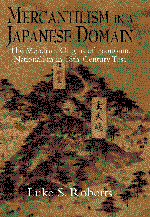Book contents
- Frontmatter
- Contents
- List of maps, tables, and figures
- Acknowledgments
- Dates and units of measurement used in the text
- Maps
- 1 Introduction
- 2 The geography and politics of seventeenth-century Tosa
- 3 Creating a crisis in Tosa, 1680–1787
- 4 The decline and restoration of domain finances
- 5 Voices of dissatisfaction and change: The petition box
- 6 Imagined economies: Merchants and samurai
- 7 Declining service
- 8 Cooking up a country: Sugar, eggs, and gunpowder, 1759–1868
- 9 Conclusion
- Glossary of terms and manuscript document titles used in the text
- Sources for figures and tables
- Works and documents cited
- Index
8 - Cooking up a country: Sugar, eggs, and gunpowder, 1759–1868
Published online by Cambridge University Press: 17 September 2009
- Frontmatter
- Contents
- List of maps, tables, and figures
- Acknowledgments
- Dates and units of measurement used in the text
- Maps
- 1 Introduction
- 2 The geography and politics of seventeenth-century Tosa
- 3 Creating a crisis in Tosa, 1680–1787
- 4 The decline and restoration of domain finances
- 5 Voices of dissatisfaction and change: The petition box
- 6 Imagined economies: Merchants and samurai
- 7 Declining service
- 8 Cooking up a country: Sugar, eggs, and gunpowder, 1759–1868
- 9 Conclusion
- Glossary of terms and manuscript document titles used in the text
- Sources for figures and tables
- Works and documents cited
- Index
Summary
The fruits of this wild wax tree [can be used] to make hair oil and candles for the needs of the country. … The lord has recently opened up the demesne mountains in the eastern six counties to allow mountain guards to collect the fruits which we buy at a good price, and this should work for the prosperity of the country. … Until now in this county [of Hata] these seeds have been allowed to fall and rot upon the ground!
From order by Hata county government, Motoi Gennojō, 7/30/1839The reforms of 1787 were an important turning point in Tosa history. The most easily identifiable result of these reforms was the restoration of the stability of domain finances. Cost-cutting measures were made possible by a new domainal government desire to limit the costs of Edo life and bakufu duty. The reduced burden on the local economy immediately allowed the people to enter a new period of growth, which focused on increasing the exports of traditional Tosa products and the development of new sustainable industries. The rhetoric of lordly rule remained dominant, but to the degree that the government decreased its role in the pyramidal economy of service centered on the shogun, it increased its role, both in actuality and in rhetoric, in the “internationally” conceived commercial economy.
- Type
- Chapter
- Information
- Mercantilism in a Japanese DomainThe Merchant Origins of Economic Nationalism in 18th-Century Tosa, pp. 177 - 197Publisher: Cambridge University PressPrint publication year: 1998



